In a candid conversation, Ms. Redzinna Dolly Cassim from Kenya and Mr. Simon Ubengi Elnour Bagini from South Sudan, participants of the Japan International Cooperation Agency Development Studies Program (JICA-DSP), share their experience with the 5-day program “Understanding the Japanese Development Experience,” held at International University of Japan in Niigata.
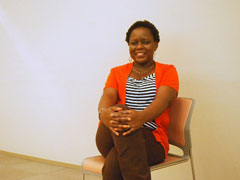
Name: Redzinna Dolly Cassim
Country of Origin: Kenya
Faculty and University: Graduate School of Science and Technology, Niigata University
Research Area/Theme: Effects of gamma radiation to the nutritional and functional components of mulberry leaves and fruit
JICA Course: Master's Degree and Internship Program of African Business Education Initiative for Youth (JFY2019)
Before coming to Japan, Redzinna worked as a food scientist at the National Sericulture Research Centre. She was motivated to apply for JICA-DSP owing to her lifelong fascination with Japan and its culture. She says, "I have worked under several excellent JICA projects in sericulture, and so when I had the opportunity to apply to JICA-DSP, there was no stopping me!"
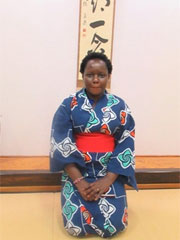
Regarding her experience at the 5-day program, Redzinna explains how the course gives a chance for students to see the real Japan. She says, "As part of the course, I got to participate in a few interesting Japanese traditions, such as rice harvesting and tea ceremonies—I even wore the kimono! I've never had this opportunity before."
Redzinna explains how the 5-day program gave her chance to learn about the "hidden" history of Japan. She explains, "While the rest of the world usually studies about the post-War period in Japan, this course gave students a chance to explore its cultural history in detail."
Moreover, when asked how this program help eager learners with similar interests to hers, she says that she found the course to greatly enhance skills such as critical thinking. She explains that, often, it is the simple things that people take for granted, but the Japanese use them to move ahead.
Regarding her future, Redzinna hopes to continue her work in sericulture. She talks about how she got a chance to visit various sericulture centers in Japan and learn different ways of improving current methods, even applying food culture to silk production methods. Redzinna says, "This course has not just fulfilled my expectation, but exceeded them! I gained various new perspectives. In fact, the course is coordinated in a manner that you always know what to do and which semester to choose—it's so relaxing yet enriching!"
Redzinna concludes by sharing her take on the role of JICA-DSP in global development. She explains that, in Kenya, very few people understand the culture in Japan and how to apply it, but JICA-DSP plays a crucial role in helping students worldwide explore this culture.
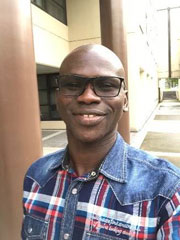
Name: Simon Ubengi Elnour Bagini
Country of Origin: South Sudan
Faculty and University: Graduate School of Science and Technology, Niigata University
Research Area/Theme: Study on production and purification of biodiesel derived from plant oil
JICA Course: Master's Degree and Internship Program of African Business Education Initiative for Youth (JFY2019)
Simon is from South Sudan, East Africa, and has a degree in gas and petrochemical engineering from Alexandria University, Egypt. His fascination with Japan began with learning about its incredible post-War recovery. He says, "I have always wanted to come to Japan to experience its culture. Japan faced many adversities during the war, but its rapid recovery and development are commendable. JICA programs offer an opportunity to learn about these aspects and are well known for their high-quality courses." This paved the way for him to apply to the 5-day program "Understanding the Japanese Development Experience"
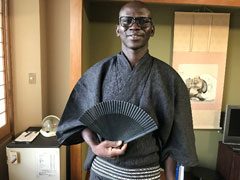
Simon believes that the course gave him some unique insights into life in Japan, from its history and modernization to the development of technology. He says, "In just 5 days, I've learned so much about Japan! We often hear about the post-war era in Japan, especially how the country overcame various hurdles. But through this course, I also learned about its agricultural development, technology, and, most importantly, its culture."
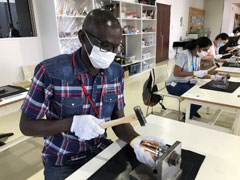
Simon goes on to elaborate that the program is an interdisciplinary course—a hybrid between different fields of science and technology. Although he has many years of experience as a chemical engineer, he believes that learned some completely new things, such as the Japanese system of management, technology, and modernization, among others.
In fact, he believes that this program would be of immense help to eager learners with similar interests. He says, "It can help those who want to learn about modern technology and culture and contribute to the economies of their respective countries."
Not just this, Simon thought that the program was much more than just an academic course. He says, "I was amazed to see how approachable and friendly our professors from IUJ were. The people in Niigata were so kind too!"
In the future, Simon is eager to apply his learnings from this course not just to his professional work but also at the grass-root level. He aims to volunteer to help the people of his country by promoting the mechanized system of agriculture in rural areas. He says, "I think the local communities in my country would immensely benefit from this system."